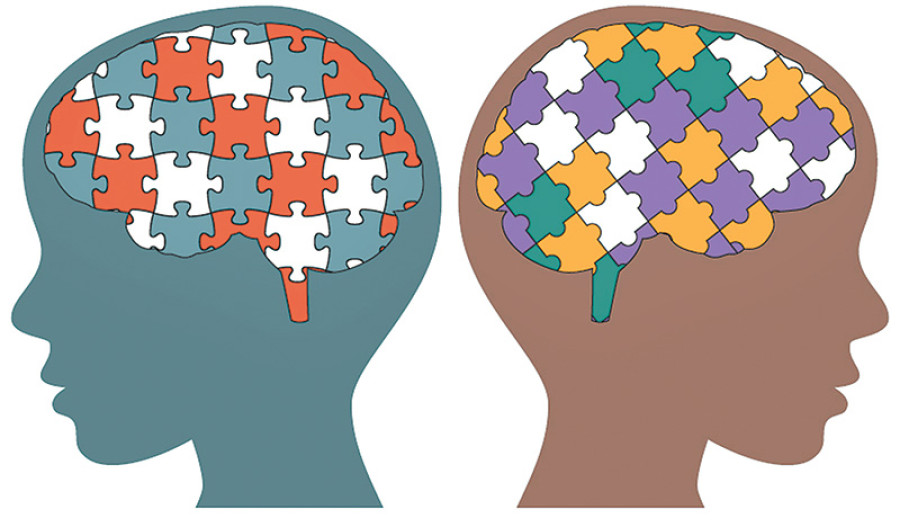Tue, Mar 3, 2026
Opinion
Beautiful minds
Time, energy and resources need to be channelled towards fostering a positive perception of autism
bookmark
Kritika Lamsal
Published at : April 1, 2018
Updated at : April 1, 2018 08:16
Autism was the fifth most common ‘what is?’ question on Google in 2014, which gives us an estimate about a general person’s curiosity regarding the topic. It isn’t surprising that autism has become a subject of interest given that the number of people diagnosed under the Autism Spectrum Disorder seems to be on the rise every year all around the world. The condition which affected up to one in 110 children a decade ago is currently affecting one in every 68 children born in the United States. According to nation-wide comparisons, more children are affected by autism than by diabetes, AIDS, cancer, cerebral palsy, cystic fibrosis, muscular dystrophy or Down syndrome—combined.
Lagging behind
Even though there is no reliable source for the exact number, Nepal seems to be following the same trend based on analysis by paediatricians and special educators. Autism Care Nepal Society, a parent run non-profit working on autism, predicts there are over 300,000 autistic people living in Nepal.
Given the rising prevalence rate as well as the width of the spectrum, autism has been prioritised and recognised as a health issue by many governments worldwide. Nepal is way behind in that regard. It is true that people with autism in even the most developed nations face their share of challenges despite the fact that autism is prioritised as a health issue. It is also true that Nepal does not enjoy the resources and facilities that other countries do. Now, getting the right recognition as well as adequate commitment from the government is essential. Without this, concrete progress will never be made.
During a programme held as part of the World Autism Awareness Month by Autism Care Nepal Society in April 2017, then Minister for Health Gagan Thapa conceded that the government has not been able to pay adequate attention to the needs of the autistic population of the country because of its large scope of responsibilities. However, he acknowledged that the health ministry is willing to work in partnership with civil society organisations that have been working for the welfare of those who are affected by autism.
Small steps
Autism Spectrum Disorder was listed wrongly under intellectual disability in Nepal until recently. It is true that many people with autism find it difficult to carry out tasks that a neuro-typical person performs without much thought: like socialising or interacting in class. But many people with autism are talented in their own field of interest, from attention to detail to quick problem solving. So, it is wrong to generalise that all people with autism suffer from intellectual shortcomings and mislabel it. After years of advocacy aimed at categorising autism separately, it is now recognised as a neurological disorder in Nepal. This was a small feat of its own for the autistic community in Nepal.
Autism is also finally on the radar of the Health Ministry, which is another sign of progress. The Leprosy Control Division under the Government of Nepal works to curb instances of leprosy, which is one disease that Nepal has successfully reduced to low prevalence levels, and this division is now the unit responsible for working towards the welfare of those who are affected by neurological disorders like autism. While the fact that the Leprosy Control division is taking over governmental autism-related activities may seem unusual, at least it signals a start. Now that Nepal is working towards complete leprosy elimination, the Leprosy Control Division might be able to channel some time, energy and resources towards autism. It is better to have a unit that has the wrong name but the right intentions towards an issue rather than to have an issue shunted aside entirely.
The problem is that while these may count as victories, they are insignificant when compared to the enormity of the problem. It is necessary to reach out to those people with autism and their families and to foster a positive perception of autism which is only possible through larger community engagement and awareness.
Autism is a life-long condition without a known cause or cure. However, people in the spectrum can lead better lives through early intervention, inclusive education and community support. My friend in the United States sent me a link about research that transfers genomes of persons with autism and their families to a cloud database to isolate the causes of autism and find new genetic targets for treatment. While I don’t expect to share similar links with her about research of that nature in Nepal, I am hopeful that those people with autism who are currently living in Nepal and who face stigma, systemic biases and misunderstanding will be seen in a positive light with more acceptance and care when the larger society realises how dealing with autism can be easier with a little understanding and empathy.
Lamsal belongs to the Siblings Support Group under Autism Care Nepal Society
Editor's Picks
Five and half decades of KP Oli in Nepali politics
How Facebook’s algorithm is amplifying one party over all others
Nepal’s IT exports near $1 billion. Can the momentum be sustained?
Parties’ lofty pledges on economy collide with hard realities
Upper house passes tourism bill with tougher Everest rules
E-PAPER | March 03, 2026
×




 9.89°C Kathmandu
9.89°C Kathmandu










